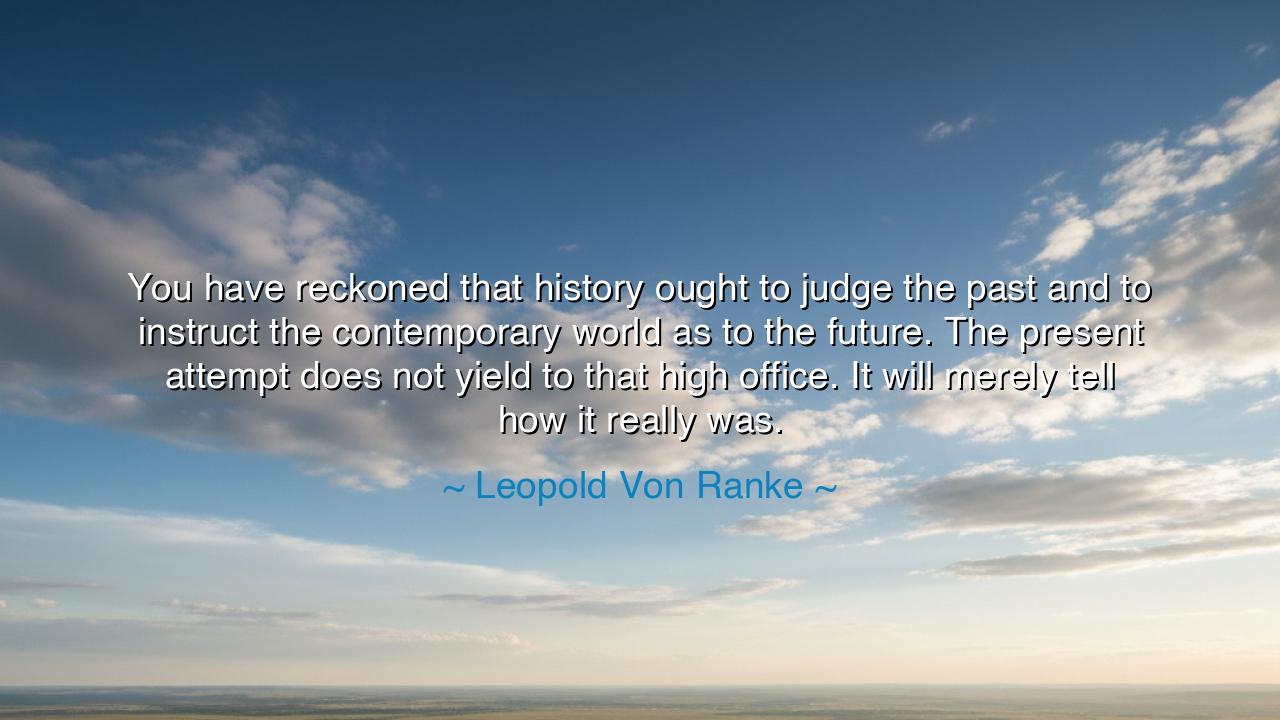
You have reckoned that history ought to judge the past and to
You have reckoned that history ought to judge the past and to instruct the contemporary world as to the future. The present attempt does not yield to that high office. It will merely tell how it really was.






"You have reckoned that history ought to judge the past and to instruct the contemporary world as to the future. The present attempt does not yield to that high office. It will merely tell how it really was." These words by Leopold Von Ranke, a renowned historian, strike at the heart of the eternal struggle between truth, interpretation, and the purpose of history itself. Ranke’s assertion speaks to a fundamental truth about the role of the historian: history, in its purest form, is not meant to offer judgments, prescribe solutions, or shape the future, but rather to present the past in its unadulterated form, to reveal how things really were. This is a profound call to objectivity—the historian’s task is not to manipulate the past or draw lessons from it for the future, but to document and understand the events as they actually occurred.
In the ancient world, historians and philosophers like Herodotus and Thucydides often wrestled with the purpose of recording events. Herodotus, known as the “Father of History,” sought not only to record events but also to explain them, often attributing them to divine will or moral lessons. His histories aimed to offer a moral judgment of the past. However, Thucydides, in his writing of the Peloponnesian War, took a different approach. He was more concerned with presenting events in their raw truth, without embellishment or moral judgment. His desire was to capture reality without turning it into a tool for teaching or moralizing. Thucydides and Ranke share a common belief that history should serve as a mirror, reflecting the past as accurately as possible, without the filter of ideology or future aspirations.
Ranke’s view builds on this ancient tension between the historian as moral guide and as truth-teller. In his eyes, the historian’s duty is not to use history as a means of shaping the future, but to serve as an honest recorder of what really happened. He warned against the temptation to read into the past only what is convenient or fitting for contemporary needs. This idea of historical purity is rooted in the belief that the past, in all its complexities and contradictions, holds lessons for those who are willing to look at it in its unvarnished form. History, according to Ranke, is not a tool for justifying present actions or predicting the future, but for understanding the forces that shaped the world we live in today.
Take, for example, the story of the Roman Empire, whose rise and fall have been the subject of countless historical writings. Historians like Edward Gibbon have written extensively about the decline of Rome, often seeking to draw conclusions about the causes—moral decay, economic mismanagement, or military failure. However, in Ranke’s view, while these analyses may be insightful, they risk overshadowing the truth of what happened: the historical events themselves, stripped of their moral judgments. The fall of Rome is not simply a lesson on how empires decay but is a historical event that must be understood in terms of the complex and often contradictory forces at play in its decline. Ranke would have insisted that we look at the facts, the decisions, the people, and the circumstances that led to Rome’s fall, without imposing our own biases or moral lessons onto them.
The core of Ranke’s philosophy lies in his commitment to presenting history as it truly was, regardless of how uncomfortable or inconvenient that might be for contemporary readers. This pursuit of historical truth—without embellishment, without moralizing, and without seeking to change the course of history—can be seen as a call to integrity. It’s a reminder that history is not a tool for our own political ends or a medium to shape the world according to our desires. The past exists to be understood, not manipulated. History must serve as an honest reflection of human actions, both noble and flawed, so that we may better understand the forces that shape us, without attempting to draw immediate lessons for future action.
The lesson we learn from Ranke’s perspective is critical in today’s world. We live in an age where history is often weaponized to support political ideologies, where the past is cherry-picked to justify contemporary actions or predictions about the future. Ranke’s warning is that such manipulation strips history of its truth, turning it into something convenient, not something real. Just as Ranke called for historical integrity, we must approach our own lives with a similar commitment to honesty. We must reflect on our actions and decisions without the need to fit them into a narrative that suits our present needs. The past, whether it is the history of nations or our own lives, should be embraced in its full complexity, for it is only through this acceptance that we can truly learn and grow.
Thus, let us apply the wisdom of Leopold Von Ranke in our own lives. Let us embrace the past as it was, not as we wish it to have been. Let us look to history—not to justify our present or predict our future, but to understand the forces that have shaped us. By doing so, we honor the true role of history: not as a tool for manipulation, but as a guide to truth—a truth that can enlighten, educate, and shape our future, without altering the course of the past. Understanding the truth of history, in all its complexity, is the first step in shaping a more thoughtful and informed future.






AAdministratorAdministrator
Welcome, honored guests. Please leave a comment, we will respond soon